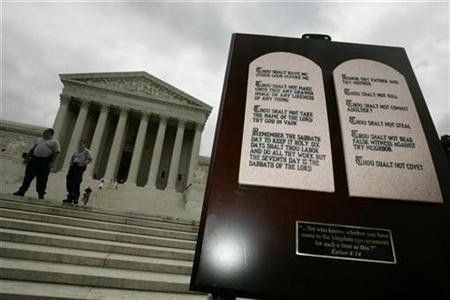Appeals Court Reignites Religious Row Over Ten Commandments In North Dakota

A federal appeals court last week reignited a religious row in North Dakota between an atheist group fighting a decades-old Ten Commandments monument on public property and Fargo, the state's largest city.
A federal appeals court last week said the Red River Freethinkers group can sue the city on First Amendment grounds to remove the privately-donated monument, which became the subject of a lawsuit in 2002 -- decades after its 1961 installation.
The city's display of the Ten Commandments monument has continued now for fifty years with no end in sight. Those members have encountered the monument, causing them 'to feel isolated and unwelcome in the city,' the Eighth Circuit Court of Appeals opinion said. Those injuries are personal to Freethinkers' members.
The lawsuit arose after the Freethinkers had their first suit against the Ten Commandments display tossed out of court. Instead of appealing, the group petitioned the city to allow a monument that states the U.S. is not in any sense founded on the Christian religion, a phrase taken from a 1797 treaty that features a religious clause.
The city ultimately passed an ordinance that rejected the Fargo atheist group's proposal, as well as all future petitions, and maintained the Ten Commandments display. The Freethinkers filed a second suit in 2008 around the new Fargo ordinance, claiming it was an endorsement of religion in violation of the First Amendment.
That 2008 suit was tossed out of a federal trial court over lack of standing to sue the city. The Eighth Ciircuit's Friday decision to revive the suit will allow another controversial First Amendment Establishment Clause case to be litigated through the federal court system, potentially reaching the Supreme Court.
Over the last decade, the justices have wrestled with high-profile religious displays on public property, including two involving Ten Commandments monuments on Texas' capitol grounds and in a Kentucky courthouse. Decided on the same day in June 2005, the justices came to opposite conclusions on whether the states had endorsed a religion -- backing Texas, while ruling against Kentucky.
There are religious monument cases that the Supreme Court has avoided. In October, the justices refused to hear an appeal over crosses on public highways memorializing slain police officers, allowing a court victory for an atheist group to stand. Utah had approved the privately-funded crosses that bore the state highway patrol symbol.
The decision to decline the case drew a public rebuke from Justice Clarence Thomas, who wrote in a brief that the case law around religious monuments was a mess, citing the opposite conclusions in the Texas and Kentucky Ten Commandments cases.
A display of the Ten Commandments on government property also violates the Establishment Clause, except when it doesn't, Thomas wrote in October. One might be forgiven for failing to discern a workable principle that explains these wildly divergent outcomes.
© Copyright IBTimes 2024. All rights reserved.





















